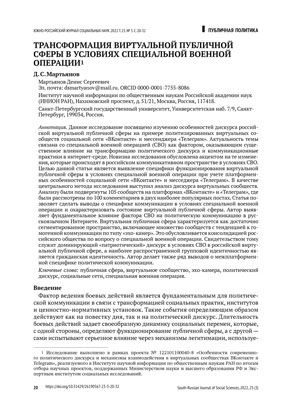Аннотация
Данное исследование посвящено изучению особенностей дискурса российской виртуальной публичной сферы на примере политизированных виртуальных сообществ социальной сети «ВКонтакте» и мессенджера «Телеграм». Актуальность темы связана со специальной военной операцией (СВО) как фактором, оказывающим существенное влияние на трансформацию политического дискурса и коммуникационные практики в интернет-среде. Новизна исследования обусловлена акцентом на те изменения, которые происходят в российском коммуникативном пространстве в условиях СВО. Целью данной статьи является выявление специфики функционирования виртуальной публичной сферы в условиях специальной военной операции при учете платформенных особенностей социальной сети «ВКонтакте» и месседжера «Телеграм». В качестве центрального метода исследования выступил анализ дискурса виртуальных сообществ. Анализу были подвергнуты 105 сообществ на платформах «ВКонтакте» и «Телеграм», где были рассмотрены по 100 комментариев в двух наиболее популярных постах. Статья позволяет сделать выводы о специфике коммуникации в условиях специальной военной операции и охарактеризовать состояние виртуальной публичной сферы. Автор выявляет фундаментальное влияние фактора СВО на политическую коммуникацию в русскоязычном Интернете. Виртуальная публичная сфера характеризуется как достаточно сегментированное пространство, включающее множество сообществ с тенденцией к гомогенной коммуникации по типу «эхо-камер». Это обусловливается консолидацией российского общества по вопросу о специальной военной операции. Свидетельством тому служит доминирующий «патриотический» дискурс в условиях СВО в российской виртуальной публичной сфере, а наиболее распространенной групповой идентичностью является гражданская идентичность. Автор делает также ряд выводов о межплатформенной специфике политической коммуникации.
Ключевые слова
Информация о финансировании
Исследование выполнено в рамках проекта № 122101100040-8 «Особенности современного политического дискурса и механизмы взаимодействия в виртуальных сообществах ВКонтакте и Telegram», реализуемого в Институте научной информации по общественным наукам РАН по итогам отбора научных проектов, поддержанных Министерством науки и высшего образования РФ и Экспертным институтом социальных исследований.
Библиографические ссылки
Al-Saggaf, Y. (2006). The Online Public Sphere in the Arab World: The War in Iraq on the Al Arabiya Website. Journal of Computer-Mediated Communication, 12(1), 311–334. DOI 10.1111/j.1083-6101.2006.00327.x
Antyukhova, E. A., Blokhin, V. F. (2022). Transformaciya publichnoy sfery v gody Pervoy mirovoy voyny: Otnosheniye k voyne i miru [Transformation of the Public Sphere During the First World War: Attitudes towards War and Peace]. Vestnik Volgogradskogo gosudarstvennogo universiteta. Seriya 4: Istoriya. Regionovedeniye. Mezhdunarodnyye otnosheniya [Bulletin of the Volgograd State University. Series 4: History. Regional studies. International Relations], 27(1), 6–19.
Asen, R., Brouwer, D. (Eds) (2001). Counterpublics and the State. New York: State University of New York.
Castells, M. (2016). Vlast’ kommunikacii [Power of Communication]. M.: Izd. dom Vysshey shkoly ekonomiki.
Dahlberg, L. (2001). Computer-mediated Communication and the Public Sphere: A Critical analysis. Journal of Computer-Mediated Communication, 7(1). Retrieved from http://jcmc.indiana.edu/vol7/issue1/dahlbergold.html
Foot, K. A., Schneider, S. M. (2002). Online Action in Campaign 2000: An Exploratory Analysis of the U. S. Political Web Sphere. Journal of Broadcasting & Electronic Media, 42(2), 222–244.
Fraser, N. (1990). Rethinking the Public Sphere: A Contribution to the Critique of Actually Existing Democracy. Social Text, 26, 56–80. DOI 10.2307/466240
Gibson, A. (2019). Free Speech and Safe Spaces: How Moderation Policies Shape Online Discussion Spaces. Social Media + Society, 5(1). Retrieved from https://journals.sagepub.com/doi/10.1177/2056305119832588
Habermas, J. (1989). The Public Sphere. In S. Seidman (Ed.) Jurgen Habermas on Society and Politics: A Reader(pp. 231–236). Boston: Beacon Press.
Mart’yanov, D. S. (Ed.) (2019). Upravlyayemost’ i diskurs virtual’nykh soobshchestv v usloviyakh politiki postpravdy [Manageability and Discourse of Virtual Communities in the Context of Post-truth Politics]. SPb.: ElekSis.
Martyanov, D. S. (2012) Transformaciya konceptual’noy skhemy “Politika i Internet” v postglobal’nom kontekste [Transformation of the Conceptual Scheme “Politics and the Internet” in a Post-global Context]. Politicheskaya ekspertiza: POLITEKS [Political Expertise: POLITEKS]. 8(3), 160–169.
Martyanov, D. S. (2014). Setevaya identichnost’: Transformaciya fenomena i podhodov k izucheniyu [Network Identity: Transformation of the Phenomenon and Approaches to Learning]. Politicheskaya ekspertiza: POLITEKS [Political Expertise: POLITEKS], 10(4), 142–160.
Martyanov, D. S., Lukyanova, G. V. (2021). Emocional’naya publichnaya sfera: polyarizaciya paralingvisticheskogo internet-diskursa [Emotional Public Sphere: Polarization of Paralinguistic Internet Discourse]. Vestnik Moskovskogo universiteta. Seriya 10. Zhurnalistika [Bulletin of Moscow University. Series 10. Journalism], 2, 25–48.
Martyanov, D. S., Martyanova, N. A. (2019). Upravlyaemost’ virtual’nykh soobshchestv: sravnitel’nyy analiz politizirovannyh grupp Vkontakte [Manageability of Virtual Communities: A Comparative Analysis of Politicized Vk.com Groups]. Zhurnal politicheskih issledovaniy [Journal of Political Studies], 3(3), 79–93.
Negt, O., Kluge, A. (1993). Public Sphere and Experience: Toward an Analysis of the Bourgeois and Proletarian Public Sphere. Minneapolis: University of Minnesota Press.
Poor, N. (2005). Mechanisms of an Online Public Sphere: The Website Slashdot. Journal of Computer-Mediated Communication, 10(2). Retrieved from https://onlinelibrary.wiley.com/doi/10.1111/j.1083–6101.2005.tb00241.x DOI 10.1111/j.1083–6101.2005.tb00241.x
Semenov, E. E. (2017). Transnacional’naya publichnaya sfera: effekty globalizatsii [The Transnational Public Sphere: The Effects of Globalization]. Kontekst i refleksiya: filosofiya o mire i cheloveke [Context and Reflection: Philosophy about the World and Man], 6(6A),166–173.
Sunstein, C. R. (2009). Republic.com 2.0. Princeton: Princeton University Press.
Tumanova, A. S. (2012). Organizaciya pomoshchi frontu i zhertvam voyny kak rezul’tat sovmestnykh usiliy vlasti i grazhdanskogo obshchestva v gody Pervoy mirovoy voyny: institucional’nyy i pravovoy aspekty [Organization of Assistance to the Front and War Victims as a Result of Joint Efforts of the Authorities and Civil Society during the First World War: Institutional and Legal Aspects]. Grazhdanskoye obshchestvo v Rossii i za rubezhom [Civil Society in Russia and Abroad], 4, 34–40.


